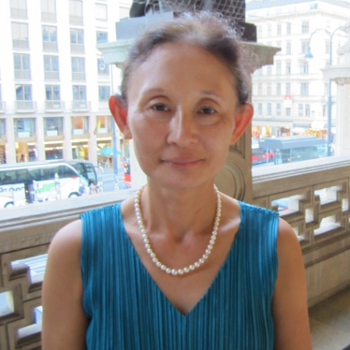Bayreuth Festival performed the first of its Götterdämerungs on Friday. On Sunday, in the small Austrian town of Erl – about 400km from Bayreuth Green Hill – the fortunate audience, many bleary-eyed with lack of sleep, experienced the same opera performed under the direction of conductor Gustav Kuhn in the 24-hour Ring. While the staging was minimal and most singers were unknown, it was a tremendous success, with many of the audience vowing to return for next year’s Ring, to be performed in a more civilized schedule of four consecutive evenings.
The Norns use a set of three criss-crossing poles as anchors to their ropes of life. Scene changes are handled deftly and quietly throughout during the musical transitions, as Brünnhilde and Siegfried’s parting scene with the two singing from a raised stand quickly making way to the Gibichung’s hall, which is a living room with chairs, sofa and cocktail tables. Gunther is dressed in a smart business suit, and Hagen in a black striped one more suited to a bodyguard, Gutrune in a cocktail dress. Siegfried’s Rhine Journey is accomplished via the aisle in the auditorium; he exits and re-enters through the rear door, accompanied by extras of local children carrying an oar and a model horse.
Stage direction clearly aims to integrate the audience in the action, and is quite successful in this respect. By the time Brünnhilde, covered by a red shawl, ducks slowly behind a tall podium from which she has just delivered the Immolation Scene, the stage is dark with only several dishes of fire burning, and we were able to luxuriate in the final musical moments of the Ring. There were several seconds of silence before the hall erupted with applauses and bravos.
While singing throughout the Erl Ring was somewhat uneven in quality, it was clear that the best singers were saved for Götterdämmerung. The biggest cheer went, deservedly, to a Swiss soprano Mona Somm as Brünnhilde. She sang and acted the demanding role with poise and energy with a clear voice that penetrated throughout the auditorium. Her high notes occasionally turned a bit sharp and one may wish for more warmth in the middle, but she was never shrill and was able to ride the dense orchestra music with ease. Tall and slim, she cut a striking figure on stage. She hit all her notes squarely and cleanly, and her confidence never flagged; the Immolation Scene was moving.
Somm was ably supported by strong male voices. Andrea Silvestrelli as Hagen has a deep gravelly voice that may not be to everyone’s liking, but his strong voice boomed loud and clear, and his horn call scene with excellent male chorus was memorable. Michael Kupfer, who sang Wotan in Das Rheingold, was luxury casting as a good-looking and cocaine-snorting Gunther, and excelled in conveying the character’s ambivalence in being pulled into Hagen’s scheme. The vengeance trio was particularly impressive, as one could hear all three singers clearly as they swore their revenge on Siegfried.
Gianluca Zampieri’s Siegfried was a bit more problematic. He sports shoulder-length straight hair and has a pleasant look of a young hero. His middle voice is particularly sonorous, and he sang the role lyrically throughout, never resorting to shouting. While he was able to hit the high note at the beginning of the third act as he greets his fellow hunters, he sometimes had trouble with others. He nevertheless maintained his stamina and delivered a touching death scene.
Thomas Gazheli, so impressive as Alberich in Das Rheingold and as the Wanderer in Siegfried, returned as Alberich, hoisted over the stage by ropes attached to the back as Act II began. He slowly descended close to the stage as he sang and handed a spear to his son Hagen, thereby clearly indicating that Alberich is the instigator of the final conspiracy to regain the ring. Besides Somm, Gazhelli was the vocal hero of the Erl Cycle, consistently delivering a high level of performance.
The female voices were perhaps less impressive but they all sang and acted from their hearts. Anne Schuldt was a solid Waltraute, and her brief scene with Brünnhilde was touching. Susanne Geb played Gutrune first as a flirt (she flirts with her brothers as well as with Siegfried) and then as a rival to Brünnhilde as a strong-willed woman. The unconventional end of Act II, with Brunnhilde and Gutrune confronting each other alone on stage, was a nice directorial touch. The three Japanese Rhinemaidens returned from Das Rheingold to sing the more sophisticated music; the norns sang mostly in darkness, but their foreboding was ominous as well as elegant.
The orchestra had very occasional mishaps, in winds and brass especially, but their playing remained at a very high level. The conductor never seemed to hurry the tempo, and yet the first act took only 1 hour and 45 minutes. He has the ability to move the music and action along without unnecessary pauses and the entire opera seems to fly by.
Two horn players were singled out at the curtain call. The closing scene, with all six harps up high on the terrace playing simultaneously as we imagined the Valhalla going up in flames and the world being renewed, was truly an experience to cherish. Mr Kuhn received a large ovation, as did a CEO of a construction company who apparently donated tens of millions of Euros for a new winter festival hall that is located adjacent to the Passionspielhaus, where the operas took place. The Rheinmaidens swept towards him in his seat and brought him onto the stage, where the man thanked the singers and musicians as they cheered him.




